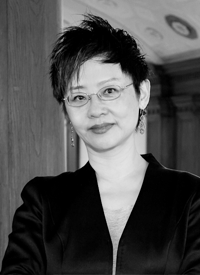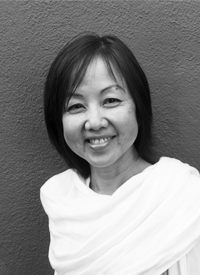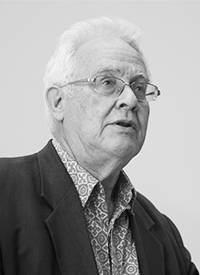The Program invites one or two Distinguished Visitors per year. These distinguished visitors are speakers of rare stature in Asia-Pacific Studies, whose work transgresses the boundaries of conventional area studies and disciplinary formations, and who have had an international impact far beyond their area specializations.
Past Visitors
LYDIA LIU

Wun Tsun Tam Professor, Department of Arts and Humanities; Director, Institute for comparative Literature and Society, Columbia University
SHADOWS OF UNIVERSALISM: THE UNTOLD STORY OF HUMAN RIGHTS AROUND 1948
How did self-determination get written into human rights? And by whom? In her lecture, Lydia Liu reopens the story of how the postwar norms of human rights were radically transformed by unexpected clashes with the classical standard of civilization in international law. She analyzes the drafting of the document of the Universal Declaration of Human Rights as well as the UN debates surrounding it to explore the translingual forging of universalism in the multiple temporalities of global history.
Lydia H. Liu is the Wun Tsun Tam Professor in the Humanities and Director of the Institute for Comparative Literature and Society at Columbia University. She is a Guggenheim Fellow in 1997 and a Fellow at the Wissenschaftskolleg zu Berlin in 2004-05. Her publications include The Freudian Robot: Digital Media and the Future of the Unconscious (2010), The Clash of Empires: The Invention of China in Modern World Making (2004), and Translingual Practice: Literature, National Culture, and Translated Modernity (1995). Recently, she published a co-edited volume called The Birth of Chinese Feminism: Essential Texts in Transnational Theory (2013) with Rebecca Karl and Dorothy Ko.
YEN ESPIRITU

PROFESSOR OF ETHNIC STUDIES, UNIVERSITY OF CALiFORNIA, SAN DIEGO
CRITICAL REFUGEE STUDIES AND THE WARS IN SOUTHEAST ASIA
The current Syrian crisis has alerted us once again to the plight of the tens of millions of displaced people who in recent times have been forced to seek refuge from political persecution, wars, and violence. Yet too often mainstream representations of generic “refugees” have figured them as merely objects of pity and benevolence, or in the worst cases into populations whose diasporic condition is in part a result of their own inability to survive in the modern and contemporary world. This symposium takes last year’s fortieth anniversary of the official end of the Vietnam War as an occasion to question mainstream memories and representations of the wars in Southeast Asia, while also calling attention to the resilience, alternative memories, and self-making of those who have relocated to the United States and Canada.
Prof. Espiritu is Professor of Ethnic Studies at the University of California, San Diego and is one of the most productive and influential scholars working in the areas of Asian American and transpacific studies as well as ethnic studies and sociology. Among her many publications, she is the author of Asian American Panethnicity: Bridging Institutions and Identities (1992); Filipino American Lives (1995); Asian American Women and Men: Labor, Laws, and Love (1997); Home Bound: Filipino American Lives across Cultures, Communities, and Countries (2003); and most recently, Body Counts: The Vietnam War and Militarized Refuge(es) (2014). Prof. Espiritu’s books have garnered numerous awards, including twice each from the Association for Asian American Studies and the American Sociological Association. Her commitment to mentoring graduate students and junior scholars, and her efforts toward diversifying the university and the academy have been recognized by awards such as the Association for Asian American Studies Mentorship Award.
HAEJOANG CHO

Professor Emeritus of Cultural Anthropology, Yonsei University
Haja Story: Youth, Learning, and Survival Politics in East Asia
This public lecture and dialogue with the wider Toronto community focused on the precarious youth at the Haja Center (the Seoul Youth Factory for Alternative Culture) and their survival politics based on Professor Haejoang Cho’s pedagogical and socio-political experiments. It was an opportunity to engage in conversations with one of Korea’s leading public intellectuals and activists. In the rapidly globalizing East Asian context, the project has evolved in response to several national and global crises: the 1997 Asian financial crisis, the 2008-2009 global financial crises, and the 2011 Fukushima disaster. Interested in a pedagogy that fundamentally connects life and learning, Professor Cho has endeavored to create platforms that enable new types of learning in various forms including a youth center, an alternative school, an after-school community, and a transition town. This talk explained the launching of these platforms and the discussion of anticipated new projects. As Ulrich Beck described in his term, “emancipatory catastrophism,” the power of transformation comes from a keen awareness of recent economic, social, and natural crises. This power is fundamental and globally shared, rather than isolated and unique. Professor Cho discussed how the youth can bring their experiences and observation of crises into an “epochal transformation” by actively making connections and creatively turning the connections into new possibilities.
LEARNING (SOUTH) KOREA: A THOUGHT ON RISK SOCIETY, VIOLENCE AND MOURNING (OVER THE SEWOL FERRY DISASTER)
Haejoang Cho spoke as a ‘native anthropologist’ about her whirlwind journey experiencing South Korea’s compressed modernity since the 1980’s. The discussion began with the recent 4/16 Sewol Ferry Disaster in Jindo, that has resonated with 9/11 and the 3/11 Disaster in Fukushima. Professor Cho focused on the split of South Korean public responses into disparate antagonistic groups; those who say to “never forget”, and those who urge to “forget and go back to normal life”. The discussion elaborated on concepts of ‘risk society’ and ‘reflexivity’ and ‘mourning’ and ‘violence’ in its analysis of compressed modernity and global capitalism as the lived experiences of people in South Korea.
Haejoang Cho is a cultural anthropologist in training and feminist in faith. She is Professor Emeritus of Yonsei University in Seoul. Her early research focused on gender studies in Korean modern history; her current interests and research are in the area of youth culture and modernity in the global/local and post-colonial context of modern day Korea. Cho is the founding director of Haja Center (The Seoul Youth Factory for Alternative Culture), an alternative educational and cultural studio for teenagers established in 1999. The Haja project has promoted ‘action research’ to address youth issues from the perspectives of feminism, cultural studies, and ecological studies in the rapidly globalizing East Asian context.
BENEDICT Anderson

Aaron L. Binenkorb Professor of International Studies (Emeritus), Cornell University
Cutting Off History at the Pass: The Rise of Homogenous Empty Time in Asia and its Consequences
This talk concerned the fascinating nexus between Time and Nationalism in the late 19th century and especially in the colonized world. This was the time when suboceanic telegraph cables, owned by huge private corporations, spread fast across the globe, thereby creating a new consciousness of global simultaneity outside the control of colonial governments. Nationalist movements, sometimes influenced by Social Darwinism, began to compare themselves with each other, in the framework of an accelerating world-time staring at the Future and the Past. The futurism was what gave nationalism a new utopian side, and separated itself from ethnicism. But it also created a mythologized ancient history, turning once geographically peripheral communities into “backward” proto-citizens, who were to be pushed into a time-machine that would quickly make them modern like the ‘rest of us.’ One significant contribution to the pervasive desire to “catch-up” on the autobahn of the Future was the appearance of a new form of fiction, which juggled with Time. One could write futurist novels, relocating current developments in Europe into the colony, and written in the past tense. Or one could imagine, from the colony, a dark vision of a violent colonial present transposed into a yet-to-come Europe.
Benedict Anderson (1936-2015) was the Aaron L. Binenkorb Professor of International Studies (Emeritus) at Cornell University. Professor Anderson was renowned for his highly influential study of the origins and spread of nationalism, Imagined Communities (1983), which has been translated into more than 20 languages. His work on nationalism is widely read across the social sciences and humanities and has been particularly influential in the fields of political science, history, anthropology, geography and comparative literature. In addition to his work on nationalism, Professor Anderson had also published extensively on the culture and politics of Southeast Asia, and their place in the broader world. His books on these topics included: Java in a Time of Revolution (1972), In the Mirror: Literature and Politics in Siam in the American Era (1985), Language and Power: Exploring Political Cultures in Indonesia (1990), The Spectre of Comparisons: Nationalism, SE Asia, and the World (1998), Under Three Flags: Anarchism and the Anti-colonial Imagination (2005), Why Counting Counts: A Study of Forms of Consciousness and Problems of Language in Noli Me Tangere and El Filibusterismo (2008), and The Fate of Rural Hell: Asceticism and Desire in Buddhist Thailand (2012). Professor Anderson was the recipient of numerous honours for his work, including the Association of Asian Studies Award for Distinguished Scholarship, the Fukuoka Prize for Studies on Asia, the Albert Hirschman Prize in the Social Sciences, a doctorate honoris causa from the Pontifical University of Peru in Lima, and the Asian Cosmopolitan Prize (Nara, Japan).
Wang Hui

Professor of Literature and History, Tsinghua University; Director, Tsinghua Institute for Advanced Studies in Humanities and Social Sciences
The Beginning of China’s Twentieth Century: Revolution and Negotiation in the Era of “Awakening of Asia”
As the twentieth century came to an end, Eric Hobsbawm defines the “short twentieth century” as a period from 1914 to 1992, beginning with the eruption of the First World War and ending with the collapse of the Soviet Union. Hobsbawm terms this period as “the age of extremes”. In his earlier work, Depoliticized Politics, Wang Hui defines the twentieth century of China as from 1911 to 1976, as part of the “long revolution”. Piecing together these two overlapping versions of “short twentieth century” that were made from different angles, Wang Hui raises two questions for his inquiry on China’s short twentieth century: How should the “continuity” between the empire compound and the sovereign state in the age of revolution at the beginning of this short century be explained? How should the “continuity” of revolution and post-revolution in the great transformation at the end of this short century be interpreted? The Chinese revolution of 1911, as the beginning of this “long revolution”, is not only the beginning of China’s “short twentieth century”, but also the most significant among the chain of events that marked the “awakening of Asia.” This lecture was a revisit to this beginning.
Wang Hui is Professor of Literature and History at Tsinghua University, and Director of Tsinghua Institute for Advanced Studies in Humanities and Social Sciences. His research focuses on Chinese intellectual history and literature. He is the author of a large number of books and articles. Among his books in English are China’s New Order: Society, Politics and Economy in Transition (Harvard University Press, 2003), The End of the Revolution: China and the limits of Modernity (Verso Books, 2009 and 2011) and The Politics of Imagining Asia (Harvard University Press, 2011). His four-volume work, The Rise of Modern Chinese Thought, is widely regarded as one of the most significant achievements across a number of fields within the last few decades.
Naoki Sakai

Goldwin Smith Professor of Asian Studies, Cornell University
The West and the Rest in Knowledge Production
Is it possible to talk of theory that is particularly Asian? Then, what is Asian theory like? Is the question a blatant oxymoron, or an intellectual anomaly? What is at stake in this inquiry is not the character of Asia at all. Rather, what makes the pairing of Asia and theory somewhat strange or unexpected is our presumption that theory is something we normally expect out of Europe or the West.
Just like any civilization, Europe produces knowledge, but it was distinguished from other civilizations by its unique mode of operation in knowledge production. Until recently, particularly in the fields of human sciences or the Humanities, Europe was proud of itself for its commitment to theory – or philosophy at large: it constantly reflected upon, and criticized and transformed its own manner of knowledge production. The Europeans regarded themselves as an exceptional kind of humanity capable of theory, and they called themselves humanitas in contrast to other types of humanity, anthropos, who were incapable of reflecting upon and criticizing their modus operandi in knowledge production. However, it is increasingly difficult to sustain this exceptionalist notion of the West or European humanity. Through an examination of the crisis in European humanity, I will discuss what the status of theory can potentially mean for us in relation to Asian humanity today.
Naoki Sakai is Goldwin Smith Professor of Asian Studies at Cornell University. He teaches in the departments of Comparative Literature and Asian Studies and is a member of the graduate field of History. He has published in a number of languages in the fields of comparative literature, intellectual history, translation studies, the studies of racism and nationalism, and the histories of semiotic and literary multitude – speech, writing, corporeal expressions, calligraphic regimes, and phonographic traditions. His publications include Translation and Subjectivity (in English, Japanese, Korean, German forthcoming); Voices of the Past (in English, Japanese & Korean); Japan/Image/the United States: The Community of Sympathy and Imperial Nationalisms (in Japanese and Korean); The Stillbirth of the Japanese as a Language and as an Ethnos (Japanese and Korean); Hope and the Constitution ( in Japanese; Korean forthcoming). Naoki Sakai serves as an associate editor for the project of TRACES, a multilingual series in four languages – Korean, Chinese, English, Spanish and Japanese (German will be added in 2013) – whose editorial office is located at Cornell, and served as its founding senior editor (1996 – 2004). In addition to TRACES, Naoki Sakai serves as a member of the following editorial boards including positions east asia cultural critique (in the United States), Post-colonial Studies (in Britain), Tamkang Review (in Taiwan), International Dictionary of Intellectual History (Britain and Germany), Modern Japanese Cultural History (Japan), ASPECTS (South Korea) and Transeuropéennes and Multitudes (in France).